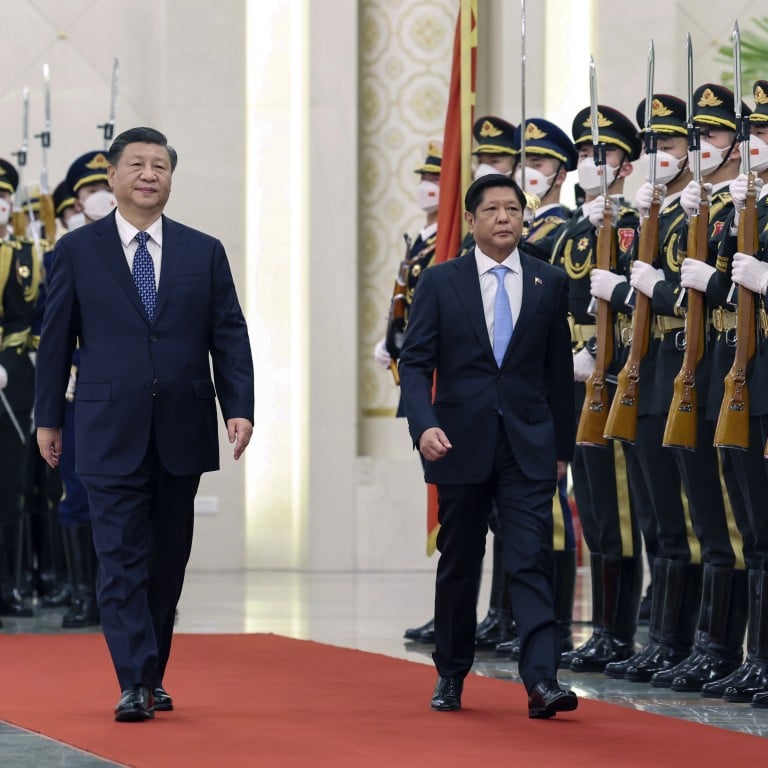China's State Media Demands Philippines Remove South China Sea Missiles

Table of Contents
China's Official Statements and Their Implications
China's state-run media outlets, including the influential Global Times and Xinhua, have issued strongly worded statements condemning the Philippine missile deployments. These statements aren't mere expressions of displeasure; they represent a significant escalation of rhetoric and reflect a more assertive Chinese foreign policy in the South China Sea.
-
Aggressive Rhetoric: The language employed is often bellicose, framing the Philippine actions as a direct threat to China's sovereignty and territorial integrity. This rhetoric is carefully crafted to exert pressure on the Philippines and deter further military buildup in the disputed areas.
-
Nine-Dash Line Assertion: The statements invariably reinforce China's expansive claims in the South China Sea, based on its controversial "nine-dash line," a demarcation that has been repeatedly rejected by international courts and many nations as lacking legal basis under UNCLOS (United Nations Convention on the Law of the Sea).
-
Strategic Posturing: These pronouncements are not isolated incidents but integral components of China's broader strategy to consolidate its control over the SCS, securing crucial maritime trade routes, valuable resources, and strategic military advantages.
-
Risk of Miscalculation: The escalating rhetoric carries a significant risk of miscalculation and unintended escalation. The aggressive posturing increases the potential for accidental clashes or deliberate actions that could rapidly spiral into a major regional conflict.
The Philippines' Response and Regional Alliances
The Philippines has responded to China's demands with a mixture of firmness and diplomacy. While avoiding direct confrontation, the Philippine government has reiterated its commitment to defending its sovereign rights and has actively sought support from its allies.
-
US-Philippines Alliance: The close military alliance between the Philippines and the United States plays a crucial role. This alliance provides the Philippines with access to advanced military technology, intelligence sharing, and potential military support in case of aggression. The enhanced defense cooperation is a direct response to China's assertive actions in the SCS.
-
ASEAN's Role: The Association of Southeast Asian Nations (ASEAN) attempts to mediate the dispute, advocating for peaceful resolution and adherence to international law. However, ASEAN's effectiveness is often hampered by internal divisions and China's considerable influence within the organization.
-
Regional Security Implications: The ongoing tensions significantly impact regional security, fostering an atmosphere of distrust and uncertainty. Neighboring countries are closely watching the developments, concerned about the potential for wider conflict and the implications for their own maritime security.
-
International Arbitration: The Philippines has consistently appealed to the 2016 Permanent Court of Arbitration ruling which invalidated China's nine-dash line claim. This ruling, while legally binding on the Philippines and China, has been rejected by Beijing, further highlighting the challenges in resolving the dispute through international legal mechanisms.
International Legal Perspectives and the 2016 Arbitral Ruling
The 2016 arbitral ruling, delivered by the Permanent Court of Arbitration in The Hague, unequivocally rejected China's expansive claims in the South China Sea based on the nine-dash line. This ruling, based on UNCLOS, is a cornerstone of international maritime law and has significant implications for the current dispute.
-
Violation of UNCLOS: China's continued disregard for the ruling and its aggressive actions in the South China Sea constitute a clear violation of international law. This blatant disregard undermines the rule of law and the international order.
-
Legal Challenges: While the ruling holds legal weight, enforcing it against a powerful nation like China presents significant challenges. International pressure and multilateral cooperation are crucial to uphold the principles of international law in the face of China's defiance.
-
International Response: The international community has largely supported the 2016 ruling, urging China to respect international law and engage in peaceful dispute resolution. However, a lack of concerted action to counter China's actions has emboldened its assertive behavior.
Economic and Strategic Ramifications
The South China Sea is a region of immense economic significance, hosting crucial maritime trade routes and rich fishing grounds. Control of this area translates directly into economic and strategic power.
-
Disruption to Maritime Trade: Escalating tensions and potential conflicts could severely disrupt maritime trade, impacting global supply chains and raising the costs of goods across the globe. The South China Sea is a vital artery for international commerce.
-
Fishing Rights Disputes: Disputes over fishing rights contribute to the overall tension. The rich fishing grounds are a critical resource for many countries in the region, and access to them is a major point of contention.
-
China's Strategic Interests: China's strategic interests in the South China Sea extend beyond economic considerations. Control of the area provides significant military advantages, allowing for projection of power and influence throughout the region.
Conclusion
China's demands for the removal of Philippine missiles from the South China Sea represent a significant escalation in the ongoing territorial dispute. The assertive statements from Chinese state media, coupled with the Philippines' reliance on its allies and the legal framework of UNCLOS, highlight the complex and volatile nature of this conflict. The potential ramifications, impacting regional security, international law, and global trade, demand immediate attention. The disregard for the 2016 arbitral ruling underscores the challenges in upholding international law in the face of powerful state actors. The escalating situation surrounding China's demands regarding the Philippines' South China Sea missiles necessitates a renewed emphasis on diplomatic solutions and adherence to international law. Continued monitoring and informed discussion are crucial to navigating this complex crisis and preventing further escalation in this vital and strategically important waterway. Stay informed on the latest developments in the South China Sea dispute and advocate for peaceful conflict resolution and respect for international law.

Featured Posts
-
 Dusan Tadic In Fenerbahce Deki Etkisi Tarihe Gecen Anlar
May 20, 2025
Dusan Tadic In Fenerbahce Deki Etkisi Tarihe Gecen Anlar
May 20, 2025 -
 La Fires Fuel Landlord Price Gouging Controversy A Selling Sunset Perspective
May 20, 2025
La Fires Fuel Landlord Price Gouging Controversy A Selling Sunset Perspective
May 20, 2025 -
 Americas Market Outlook Moodys 5 30 Year Yield Prediction And Its Effect On Sales
May 20, 2025
Americas Market Outlook Moodys 5 30 Year Yield Prediction And Its Effect On Sales
May 20, 2025 -
 Familia Schumacher Se Mareste Prima Fotografie Cu Noul Membru
May 20, 2025
Familia Schumacher Se Mareste Prima Fotografie Cu Noul Membru
May 20, 2025 -
 Manchester Uniteds 62 5m Bid For Arsenal And Chelsea Target
May 20, 2025
Manchester Uniteds 62 5m Bid For Arsenal And Chelsea Target
May 20, 2025
Latest Posts
-
 Apples Llm Siri Progress And Future Prospects
May 20, 2025
Apples Llm Siri Progress And Future Prospects
May 20, 2025 -
 Ryujinx Emulator Project Halted A Developer Statement
May 20, 2025
Ryujinx Emulator Project Halted A Developer Statement
May 20, 2025 -
 Revamping Siri Apples Focus On Llm Technology
May 20, 2025
Revamping Siri Apples Focus On Llm Technology
May 20, 2025 -
 End Of An Era Ryujinx Emulator Development Ceases After Nintendo Contact
May 20, 2025
End Of An Era Ryujinx Emulator Development Ceases After Nintendo Contact
May 20, 2025 -
 Chat Gpts Enhanced Coding Capabilities The Ai Coding Agent Explained
May 20, 2025
Chat Gpts Enhanced Coding Capabilities The Ai Coding Agent Explained
May 20, 2025
